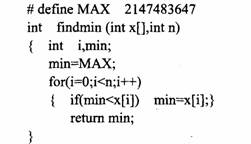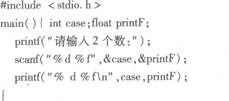如下程序编译时发生错误,错误的原因是show函数实现语句错误,则正确的语句应该为______。include<iostream.h>class test{private:int hum;public:test(int);void show( );};test::test(int n){num=n;}test::show( ){cout<<num<<endl;}void main( ){test T(10):T.show( );}
题目
如下程序编译时发生错误,错误的原因是show函数实现语句错误,则正确的语句应该为______。
include<iostream.h>
class test
{
private:
int hum;
public:
test(int);
void show( );
};
test::test(int n){num=n;}
test::show( ){cout<<num<<endl;}
void main( )
{
test T(10):
T.show( );
}
相似考题
更多“如下程序编译时发生错误,错误的原因是show函数实现语句错误,则正确的语句应该为______。 include< ”相关问题
-
第1题:
下面程序错误的语句是 ① include② void main( ) ③ { ④ int * p=new int[1] ; ⑤ p 下面程序错误的语句是
① #include<iostream.h>
② void main( )
③ {
④ int * p=new int[1] ;
⑤ p=9;
⑥ cout < < * p < <endl;
⑦ delete[ ] p;
⑧ }
A.④
B.⑤
C.⑥
D.⑦
正确答案:B
解析:本题考查的是指针的使用,p是指向int型的指针,若想给它指向的元素赋值,应使用。符号,直接赋值相当于改变了原来p存储的地址。 -
第2题:
下列有关内联函数的描述中,错误的是()。A.内联函数必须在定义处加上inline关键字,否则就是普通的函数
B.内联函数必须是一个小函数,不能包含循环、switch等语句
C.一个函数中如果包含循环、switch等语句,则将其定义为内联函数时编译器会报错
D.在编译程序时,系统会直接将调用内联函数的地方用内联函数中的语句体做等价替换,从而省去运行程序时函数调用所额外消耗的时间
正确答案:C
-
第3题:
对于已经被定义过可能抛出异常的语句,在编译时()。
A.必须使用try/catch语句处理异常
B.如果程序错误,则必须使用try/catch语句处理异常
C.不使用try/catch语句会出现编译错误
D.不使用try/catch语句不会出现编译错误
正确答案:B
-
第4题:
有如下程序:
#include<iostream>
using namespace std;
class Instrument{
public:
virtual void Display()=0;
};
class Piano:public Instrument {
public:
void Display(){/*函数体程序略*/}
};
int main(){
Instrument s;
Instrument *p=0;
//…;
return 0;
}
下列叙述中正确的是
A.语句“Instrument *p=0;”编译时出错
B.语句“Instrument s;”编译时出错
C.类Piano中的Display函数不是虚函数
D.类Instrument是一个虚基类
正确答案:B
解析:Instrument为抽象类,抽象类不能用来定义对象。故本题应选B。 -
第5题:
下面程序有注释的语句中,错误的语句是( )。 includeusing namespace std; 下面程序有注释的语句中,错误的语句是( )。 #include <iostream> using namespace std; class A{ int a; public: void show A(){cout<<"this is A!";} }; class B:public A{ int b; public: void show B(){cout<< "this is B!";} }; void main(){ A ia,*piA; B ib,*piB; piA=ia; //第一个测试语句 piA=&ib; //第二个测试语句 piA->showA(); //第三个测试语句 piA->showB(); //第四个测试语句 }
A.第一个测试语句
B.第二个测试语句
C.第三个测试语句
D.第四个测试语句
正确答案:A
解析:ia应进行取地址操作。 -
第6题:
下面的程序在编泽时产生错误,其出错原因是()。includemain(){int 1_case;float printF; 下面的程序在编泽时产生错误,其出错原因是( )。 #include<stdio.h> main() {int 1_case;float printF; printf("请输入2个数:"); scanf ("%d%f",&1_case,&printF); printf("%d%f\n",1_case,printF); }
A.定义语句出错,1_case不能作为变量名
B.定义语句出错,printF不能用作用户自定义标识符
C.定义语句无错,scanf不能作为输入函数使用
D.定义语句无错,printf不能输出1_case的值
正确答案:A
解析:C语言变量名可由数字,字母,下划线构成,但首字符不能为数字。 -
第7题:
假定已有如下变量说明和枚举定义:判断下列语句是否符合语法规则,结果是()。

A.语句1错误,语句2和语句3正确
B.语句2正确,语句1和语句3错误
C.语句3正确,语句1和语句2错误
D.语句1正确,语句2和语句3错误
参考答案:A
-
第8题:
以下函数findmin拟实现在数组中查找最小值并作为函数值返回,但程序中有错导致不能实现预定功能。

造成错误的原因是( )。
A)定义语句int i,min;中vain未赋初值
B)赋值语句min=MAN;中,不应给min赋MAX值
C)语句if(min
D)赋值语句min=MAX;放错了位置
正确答案:D
在C语言中,一个整型变量占用4个字节的内存单元,并按整型数的存储方式存放数据,允许存放的数值范围是:一2147483648-2147483647。所以在这个题目中定义的宏变量MAX的值就是整数范围内最大的数值,因而对于任意一个整数来说,其值都比MAX小,而判断最小值,是当找到的数比rain小时,才交换。 -
第9题:
有如下程序:includeusing namespace std;class MyClass{public:MyClass(int x):val( 有如下程序: #include<iostreanl> using namespace std; class MyClass{ public: MyClass(int x):val(x){ } void Set(int x){val=x;} void Print( )eonst{eout<<"val="<<val<<'\t';} private: int val; }; int main( ){ eonst MyClass objl(10); MyClass obj2(20); objl.Print(); //语句1 obj2.Print( ); //语句2 objl.Set(20); //语句3 obj2.Set(30); //语句4 return 0; } 其主函数中错误的语句是
A.语句1
B.语句2
C.语句3
D.语句4
正确答案:C
-
第10题:
请在如下程序中的空格处填写正确的语句: includeusing namespace std; class Base { 请在如下程序中的空格处填写正确的语句:
include <iostream>
using namespace std;
class Base {
public:
void fun() {cout<<"Base fun"<<endl; }
};
class Derived: public Base {
public:
void fun() {
【 】; //调用基类的函数fun()
cout<<"Derived fun "<<endl;
}
};
正确答案:Base::fun()
Base::fun() 解析:本题考查的知识点是:派生类对基类成员的访问。本题的派生类Derived覆盖了基类Base中的fun(),如需调用基类版本的fun(),则需要使用域运算符“::”。故应该填写Base::fun()。 -
第11题:
编译语句int aInt=66666不会出现编译错误。
正确答案:正确 -
第12题:
单选题有如下程序段:其中会产生编译错误的语句是( )。A④
B③
C②
D①
正确答案: A解析:
语句①是合法的引用声明语句,变量i被r引用;语句②通过引用r将变量j的值赋给变量i;语句③声明了指针变量p,并初始化指向变量i;语句④中*p代表了变量i的值,是数值常量,不能放在赋值表达式的左端。 -
第13题:
有以下程序
main( )
{ char a,b,c,*d;
a='\';b='\xbc';
c='\0xab';d="\0127";
cout<<a<<b<<c<<*d<<endl;
}
编译时出现错误,以下叙述中正确的是
A.程序中只有a='\';语句不正确
B.b='\xbc';语句不正确
C.d="\0127";语句不正确
D.a='\';和c='\0xab';语句都不正确
正确答案:D
解析:本题考察C++中各种类型在输出时的转化关系。斜杠为转义控制字符,其后必须紧跟一个字符,故首先可以确定的是a的赋值语句是错误的,根据选项我们直接看c的赋值语句是否正确。斜杠后跟0表示其后为八进制,其值从0到7,因此C的赋值语句也是错误的。据此可以判断本题的正确答案应该为D。 -
第14题:
main函数中发生编译错误的语句是______。 includeclass A { public: int a; const i main函数中发生编译错误的语句是______。
include<iostream.h>
class A
{
public:
int a;
const int b;
A( ):a(10),b(20){}
void fun( )const
{
cout<<"a="<<a<<"\tb="<<b<<endl;
}
};
void main( )
{
A obj1;
const A*ptr=new A;
ptr=&obj1;
ptr->a=100;
ptr->fun( );
}
正确答案:ptr->a=100;
ptr->a=100; 解析:本题考察的是const的使用。const修饰的是指针变量的值,指针本身是可变的,但指针所指对象的值是常量,即ptr->a是不能被改变的。 -
第15题:
有如下程序:
#include<iostream>
using namespace std;
class Music{
public:
void setTitle(char*str){strcpy(title,str);}
protected:
char type[10];
private:
char title[20];
};
class Jazz:public Music{
public:
void set(char*str){
strcpy(type,”Jazz”); //①
strcpy(title,str); //②
}
};
下列叙述中正确的是
A.程序编译正确
B.程序编译时语句①出错
C.程序编译时语句②出错
D.程序编译时语句①和②都出错
正确答案:C
解析:数据成员title在基类中声明为私有成员,派生类不能访问基类中的私有成员,故语句②在编译时出错。本题选C。 -
第16题:
阅读以下程序:
 该程序在编译时产生错误,原因是( )。
该程序在编译时产生错误,原因是( )。A.定义语句出错,Case是关键字,不能用作用户自定义标识符
B.定义语句出错,printF不能用作用户自定义标识符
C.定义语句无错,sCanf不能作为输入函数使用
D.定义语句无错,printf不能输出Case的值
正确答案:A
标识符不能与c编译系统已经预定义的、具有特殊用途的保留标识符(即关键字)同名,否则程序在编译时会出现错误。题目源程序中使用了已经预定义的关键字case,所以将出现错误。 -
第17题:
下列程序编译时发现pb->f(10);语句出现错误,其原因是______。 includeclass Base { 下列程序编译时发现pb->f(10);语句出现错误,其原因是______。
include<iostream.h>
class Base
{
public:
void f(int x){cout<<"Base:"<<x<<endl;)
};
class Derived:public Base
{
public:
void f(char*str){cout<<"Derived:"<<str<<endl;}
};
void main(void)
{
Derived*pd=new Derived;
Pd->f(10);
}
正确答案:数据类型不匹配
数据类型不匹配 解析:pd为派生类Derived的指针,指向派生类的成员函数f(char*Str),不指向基类的f(intx)。 -
第18题:
有如下程序:
Private type stu
X as string
Y as integer
End type
Private Sub Command1_Click()
Dim a as stu
a.x=”ABCD”
a.Y=12345
print a
End Sub
程序运行时出现错误,错误的原因是
A)Type定义语句没有放在标准模块中
B)变量声明语句有错
C)赋值语句不对
D)输出语句print不对
正确答案:D
【答案】:D
【知识点】:结构体类型变量的定义及使用
【解析】结构体类型的变量只能单独引用它的每一个成员,而不能整体使用。故本题选D。 -
第19题:
现有如下程序段,此程序段编译有错误,则程序段的错误出在includemain(){int a=30,b=40, 现有如下程序段,此程序段编译有错误,则程序段的错误出在 #include<stdio.h> main() { int a=30,b=40,c=50,d; d=a>30? b:c; swish(d) { case a: Printf("%d,",a); case b: printf("%d,",b); case c: printf("%d,",c); default printf("#");}}
A.default:printf("#");这个语句
B.d=a>30? b:c;这个语句
C.case a:printf("%d,",a);case b:printf("%d,",b);case c:printf("%d,",c);这三个语句
D.switch(d)这个语句
正确答案:C
解析:case也是关键字,与其后面的常量表达式合称case语句标号,常量表达式的类型必须与switch后的表达式类型相同。这个程序段主要考查的是case后是常量表达式。 -
第20题:
有如下程序: Private Type stu X As String Y As Integer End Type Private Sub Command1 Click( ) Dim a As stu X="ABCD" Y=12345 Print a End Sub 程序运行时出现错误,错误的原因是( )。
A.Type定义语句没有放在标准模块中
B.变量声明语句有错
C.赋值语句不对
D.输出语句Print不对
正确答案:D
D。【解析】本题程序的含义是,定义了一个stu类型,此类型包含有两个变量X和Y,当单击Command控件时,定义一个类型为stu类型的变量a,其中a.X的值为“ABCD”,a.Y的值为12345,再输出a。其中输出语句是错误的,此时输出只能标准输出可以输出a.X或者a.Y。 -
第21题:
下面程序错误的语句是①include②void main()③{④int * p=new int[1]⑤p=9⑥cout<<* p< 下面程序错误的语句是
①#include<iostream.h>
②void main()
③{
④ int * p=new int[1]
⑤ p=9
⑥ cout<<* p<<end1;
⑦ delete []p;
⑧}
A.④
B.⑤
C.⑥
D.⑦
正确答案:B
解析:本题考查的是指针的使用,p是指向int型的指针,若想给它指向的元素赋值,应使用*符号,直接赋值相当于改变了原来p存储的地址。 -
第22题:
下面关于文件包含语句说法错误的是()。
- A、在包含文件时,如果没有找到文件,include语句会发生警告信息,程序继续运行。
- B、在包含文件时,如果没有找到文件,require语句会发生致命错误,程序停止运行。
- C、“./”表示当前目录,“../”表示当前目录的上级目录。
- D、在包含文件时,被包含的文件路径必须是从盘符开始的路径。
正确答案:D -
第23题:
单选题下面关于文件包含语句说法错误的是()。A在包含文件时,如果没有找到文件,include语句会发生警告信息,程序继续运行。
B在包含文件时,如果没有找到文件,require语句会发生致命错误,程序停止运行。
C“./”表示当前目录,“../”表示当前目录的上级目录。
D在包含文件时,被包含的文件路径必须是从盘符开始的路径。
正确答案: D解析: 暂无解析
